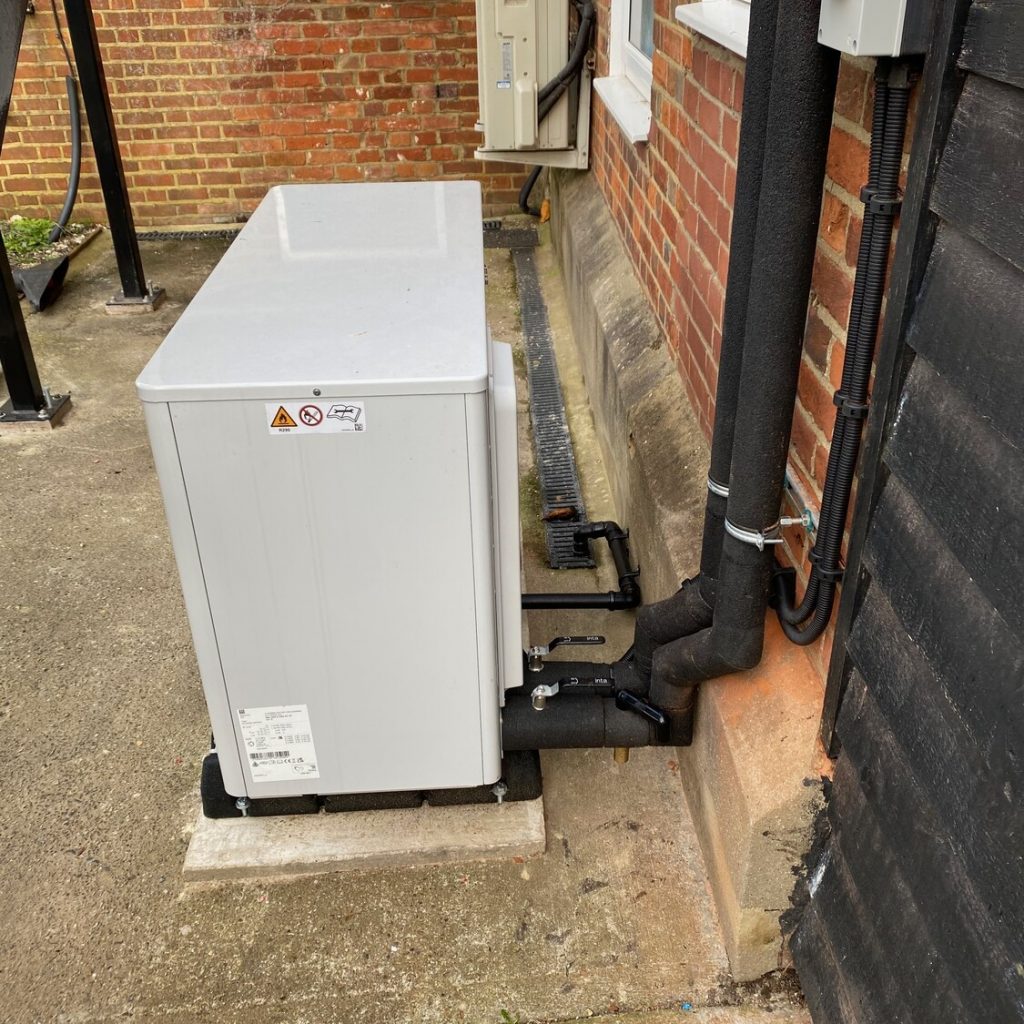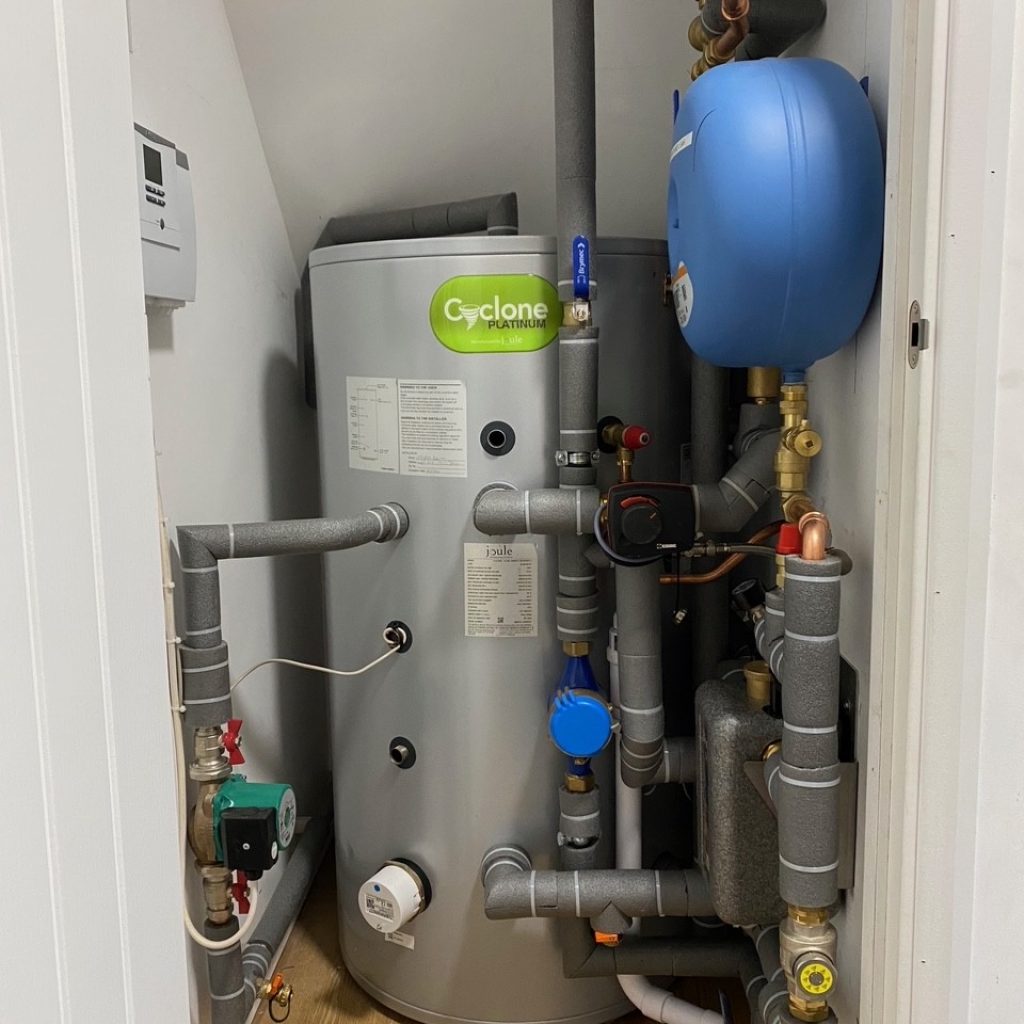The EPC Dilemma: How Current Ratings Fail Heat Pumps
This article isn’t meant to criticise heat pumps; rather, it questions the effectiveness of the EPC system for energy ratings. In December 2023, I completed a comprehensive refurbishment of a flat, enhancing its layout and adding internal wall insulation (IWI) to all external solid walls, substantial loft insulation, underfloor insulation, and new double glazing. The plumbing overhaul included a new bathroom and kitchen. For the heating, I recommended an air source heat pump (ASHP) and underfloor heating (UFH) to the client, who was receptive to my advice given the system's energy efficiency.
I installed a Vaillant UK aroTHERM plus with a Joule Heat Pump cylinder. The UFH system was designed by the manufacturer, tailored to the heat loss calculations of each room. For control, I chose Vaillant’s sensoCOMFORT and weather compensation control. Considering the compact size of the flat, I didn't install a buffer tank; the only pump used was the one integrated into the aroTHERM ASHP. I deemed individual room temperature control unnecessary for such a space and opted for a full weather-compensated control for the entire property. The system was well insulated both internally and externally, performed well, and heated the flat effectively with a flow temperature capped at 45C.

When it came time to obtain an Energy Performance Certificate (EPC), I encountered the system's shortcomings. Despite the extensive upgrades, the walls, windows and roof received good ratings, but the ASHP and UFH were only deemed 'Average'. Moreover, the hot water system was rated 'Poor', and the weather compensated control was rated 'Average', possibly because it was categorised as a programmable room stat rather than a weather compensated control. This raises the question: What system would achieve a 'Good' or 'Very Good' rating if not an ASHP with UFH?
The EPC rating is a significant factor in convincing homeowners to switch to heat pumps. Is this an issue with individual assessors, or is it the SAP calculations they must follow? In my view, the current EPC system is outdated and potentially detrimental to the heat pump industry. I’m curious to hear others' experiences with EPC ratings and their thoughts on its impact on the adoption of heat pumps.

Editor's note
The EPC is a vital tool for homeowners, offering a detailed overview of a property's energy efficiency and carbon emissions. This rating is not only crucial for understanding a home's energy performance but also influences property values and compliance with environmental standards.
However, as Chris points out through his firsthand experience, there appears to be a discrepancy in how EPCs evaluate certain energy-efficient technologies. The case in question involves a comprehensive refurbishment of a flat, where various energy-saving measures were implemented, including the installation of an ASHP. Despite these sensible upgrades, the EPC assessment yielded unexpectedly average ratings for the ASHP and underfloor heating, and even a poor rating for the hot water system.
This raises important questions about the current EPC system's ability to accurately reflect the efficiency and environmental benefits of ASHPs. Are these innovative heating systems being unfairly penalised by an outdated assessment methodology? If so, this could inadvertently discourage homeowners from adopting ASHPs, which are known for their energy efficiency and lower carbon footprint compared to traditional heating systems.
Going forward, the SAP calculations must be revised to better account for the specific efficiency and performance characteristics of air source heat pumps, considering factors like weather compensation control, underfloor heating integration and system sizing.
I believe most EPCs are done quickly and cheaply by people with minimal training and probably very limited understanding of heat pumps.Maybe the ASHP manufacturers or installers could provide a list of EPC certifiers who know the subject. Might be a bit more expensive but would give the correct rating.
More proof (if proof were needed!) that EPC’s aren’t necessarily equal or valid. The referenced presentation is about some Passive Houses that only rate a ‘B’ EPC!!!
Regards, Toodles.
Toodles, heats his home with cold draughts and cooks food with magnets.
As I understand the system, SAP (and by default RdSAP) is a CO2 reduction assessment/tool so if the house is not a new build then the EPC reports are done using the RdSAP method, which is based on the age of the house and the price of its primary fuel source, not how well it is constructed, so could give confusingly low score for a passive house. I did not watch the video so I am not sure if this was a new build or not.
I had a "whole house survey" done as part of the BEIS EoH trial, which included an EPC rating.
My bungalow (which had a G rated ie inefficient gas powered heating system) was rated 53 E.
After the heat pump was installed it was re-evaluated and it scored 71 C. However, the hot water is considered Poor 'from main system' - that's quite ridiculous as I get a COP of around 2.5 even in winter.
Also the Main heating control is rated Average with the suggestion for improvement to install Zone controls, which as we read everywhere makes heat pumps less efficient !!!
The EPC system definitely needs work.
This is a known problem and IMO is taking far too long to sort out. The problem exists right at the top of the tree with the UK standard/methodology (SAP / RdSAP) - which is then used as the base specification for EPC software etc used by the industry. So the 'error' is hard wired into the entire system. The best informed reference I have found about this:
I am a retired Head of Medical Physics (NHS) and have been working on project to support parish residents to improve the energy efficiency of their homes (retrofitting). We crashed straight into this and our practical 'sticking plaster' was to add some wording about this into retrofit survey reports to alert homeowners about the shortfalls in the modelling. This is particularly a problem with multiple renewables, eg, ASHP + solar PV + battery.
RdSAP V10 should have been released this month, but has now been delayed until 'summer'. I am told by those who know that V10 will improve the situation.
There needs to be a much stronger lobby on this. If anyone is inclined to write to their MP - this would be a good topic!
@ajn9000 Very interesting - and somewhat of an eye-opener as to how inadequate the EPC regime is! After reading this and being curious, I studied my own EPC which only made recommendations for solar heating for the DHW and fitting some PV panels. No mention of heat pump at all. To be fair, the EPC included a link to follow if I wished to carry out further improvements; on that site, I found the link to the BUS scheme. I feel this is rather a second-hand way of providing further reading and is hardly ‘in your face’, it is as though the powers that be don’t believe in or want anyone to even consider heat pumps!!! Harrumph, Toodles.
Toodles, heats his home with cold draughts and cooks food with magnets.
@toodles your EPC is a limited tool that needs to be affordable to produce - hence it heavily relies on modelling. It is geared to produce a rating, rather than an improvement plan. A retrofit assessment (as per PAS2035: https://www.trustmark.org.uk/business/information-guidance/pas-20352019-pas-203020352023) is much more useful to households, but still uses RdSAP methodology. Best to view this and EPCs as art, not science.
With what I now know, I believe that there are thousands of households holding EPC certificates who may well have been encouraged to be curious about heat pumps if the SAP / RdSAP methodology had been more fit for purpose.
Lots going on behind the scenes, eg see attached from Elmhurst. But also lots of missed opportunities, past and present.
@heat-pump-newbie I've only just spotted your post. There seems to be a lot of inconsistency in the EPC ratings. My main heating is an ASHP with underfloor heating which is rated Poor, as is the hot water, from the main system. As all the other factors are rated Good or Very Good I'm sure that the poor rating for the ASHP is responsible for my overall EPC rating of only "D", narrowly missing a "C". I don't know how anyone achieves an A or B rating - perhaps only houses meeting Passivhaus standards.
Mike
Grant Aerona HPID10 10kWh ASHP
Interesting I just checked my EPC and it is just C (70C) so if i put in a heat pump it will be downgraded to a D as the boiler and DHW were rated as good. She also said the floors were solid when apart from the kitchen they are suspended and said I had no room thermostat which I have. I am very glad I did not have to pay for that rubbish, which is at best a ticket to schemes ie BUS!
Daikin 6Kw ASHP.
MG4 EV
1926 Semi with loft and wall cavity insulation, all radiator.
- 26 Forums
- 2,367 Topics
- 53.7 K Posts
- 107 Online
- 6,042 Members
Join Us!
Worth Watching
Latest Posts
-
RE: Solis S6-EH1P8K-L-PLUS – Why I Chose It and What I’ve Learned So Far
@majordennisbloodnok To be honest, when I spoke with...
By Batpred , 4 hours ago
-
RE: Changing from 4-port buffer to volumizer
@andy1618 see the very sage advice from @editor above. ...
By JamesPa , 6 hours ago
-
RE: New Fogstar 15.5kWh upright solution
The video shows the JK balancer, but the connection of ...
By Batpred , 9 hours ago
-
RE: Ecodan unable to hit legionella target temp - what's the consensus?
@9jwr9 Hi, yes this is the issue with every (stand alon...
By ASHP-BOBBA , 10 hours ago
-
RE: Help me keep the faith with my air source heat pump installation
@adamk FWIW I managed unintentionally to 'coax' mine in...
By JamesPa , 11 hours ago
-
RE: Help needed with Grant Aerona 3 issues
Ok please post back once experiment complete. Give it ...
By JamesPa , 11 hours ago
-
RE: Octopus Cosy Heat Pump Owners & Discussion Thread
You are in essence right. Adia only works with selecte...
By JamesPa , 11 hours ago
-

No, you haven’t missed out, @batpred. This thread’ll st...
By Majordennisbloodnok , 12 hours ago
-

RE: Tesla Powerwall – More of a ‘Luxury’ Than an ROI Winner!
Also, though they weren’t prepared to match the price t...
By Toodles , 13 hours ago
-
RE: How long will your energy contract last?
My INTELLI-FIX-12M-25-08-29 has less than 12 months to ...
By Batpred , 13 hours ago
-

RE: GivEnergy 2025 forthcoming batteries and inverters
Then, perhaps @toodles , you should've made a submissio...
By Transparent , 14 hours ago
-
RE: Balancing financial efficiency and comfort using the Octopus Cosy tariff
I am wondering if anyone with an EV could find the 7p/k...
By Batpred , 14 hours ago
-
Possibly, but it would also reduce DeltaT across the em...
By JamesPa , 14 hours ago
-

RE: ASHP sizing - value of Heat Transfer Coefficient
@cathoderay It was reminiscent of the BBC Open Universi...
By Toodles , 14 hours ago
-
-

@morgan They are unsupervised these days, can’t get the...
By Toodles , 4 days ago
-

RE: Setback savings - fact or fiction?
Exactly. We only need to compare conditions, to decide ...
By cathodeRay , 5 days ago
-
RE: Need Help Optimising My Rushed ECO4 Install: 12kW Bosch Heat Pump
Welcome @mickamills We too have an oversized 12kW Sa...
By Old_Scientist , 5 days ago
-
RE: My Powerwall 3 Consumes 3-4 kWh/Day in Self-Consumption: Is This Normal?
@caron I can confirm that the power usage of the PW3 is...
By Old_Scientist , 5 days ago






